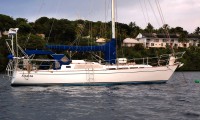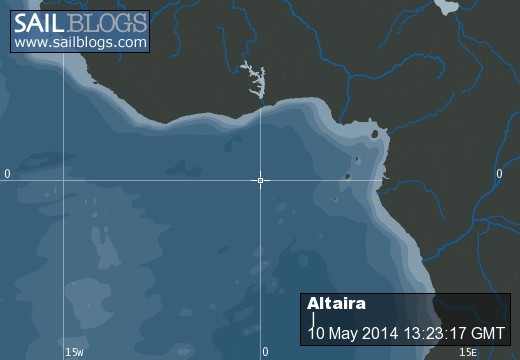Profile

Who: Kimball Corson. Text and Photos not disclaimed or that are obviously not mine are copyright (c) Kimball Corson 2004-2016
Port: Lake Pleasant, AZ
Altaira Wandering the Oceans
Favorites
- 7 Seas Cruising Association
- American Sailing Association
- Buoyweather Service
- CDC Traveler's Heath Advisories
- Cruiser Log venue
- Cruisers Forum
- Cruising Club of America
- Cruising Resources
- Cruising World Magazine
- Earthrace World Record
- Economic and Financial Indicators
- Economist Magazine
- Equipmment and Boat Reviews
- Float Plan Form
- Greenpeace Int'l
- Grib File Access
- Heavy Weather Sailing
- IMS Certificates
- Inland Travel: Expedia
- Intrade Prediction Markets
- Latitude 38
- London Financial Times
- Marine Books and Charts
- Marine Radios
- Nature Conservancy for Oceans
- New York Times
- NOAA Hurricane Analysis
- NOAA Weather Forecasts
- Noonsite, World Cruisng Info
- Ocean Cruising Club
- Overseas Mail Forwarding Services
- Practical Sailor Magazine
- RGE Economic Monitor
- Sail Gear Source I
- Sail Gear Source II
- Sail Gear Source III
- Sail Gear Source IV
- Sailboat Selection for Offshore Use
- Sailboats for Sale
- Sailing Items Sources Links
- SailMail (Marine Radio)
- Sailnet Sailing Information
- Seeking Alpha
- Tide & Current Program
- Tide Prediction Programs
- Tides & Currents
- TruthDig in the News
- U.S. Sailing Association
- Univ of Chicago Law Faculty Blog
- US State Dept Travel Advisories
- Voyage Planning (with pilot charts)
- Wall Street Journal
- Washington Post
- Weather.com
- Weather: MagicSeaweed
- Weather: Wetsand
- WinLink (Ham Radio)
- World Clock + Time Zones
09 April 2018 | Pago Pago, American Samoa
10 March 2018 | Pago Pago, American Samoa
10 March 2018 | Pago Pago, American Samoa
10 March 2018 | Pago Pago, American Samoa
22 August 2017 | Pago Pago, American Samoa
22 August 2017 | Pago Pago, American Samoa
22 August 2017 | Pago Pago, American Samoa
22 August 2017 | Pago Pago, American Samoa
22 August 2017 | Pago Pago, American Samoa
22 August 2017 | Pago Pago, American Samoa
22 August 2017 | Pago Pago, American Samoa
22 August 2017 | Pago Pago, American Samoa
22 August 2017 | Pago Pago, American Samoa
22 August 2017 | Pago Pago, American Samoa
22 August 2017 | Pago Pago, American Samoa
22 August 2017 | Pago Pago, American Samoa
22 August 2017 | Pago Pago, American Samoa
22 August 2017 | Pago Pago, American Samoa
22 August 2017 | Pago Pago, American Samoa
09 August 2017 | Pago Pago, American Samoa
The Schools of Economic Thought: a Hasty Overview
29 July 2016 | Pago Pago, American Samoa
Kimball Corson

Three Schools of Economic Thought: a Hasty Overview
Neo-Classical economic thought is what is taught as mainstream economics. It focuses on micro economic thought about how price theory determines quantities and prices of factor inputs and outputs through competitive markets by supply and demand.
Consumers proceed by a hypothesized maximization of utility subject to income-constraints and firms maximize profits using competitively priced factors of production, both in accordance with rational choice theory. It is called Neo-Classical because Keynes is included in a rarefied way such that interest rates adjust to equalize savings and investment and have national income become equal to GDP. It is very tidy and wrong on too much, especially its Keynesianism.
Opposed to this orthodoxy are two dominate schools of heterodox thinking, the New Keynesians and the Post Keynesians. The new Keynesians believe wage and prices are sticky and don't adjust properly so income has to instead. Because income has to adjust where wages and prices don't, markets do not yield proper competitive results and the economy often fails to attain full output and employment. Therefore, New Keynesians argue that macroeconomic stabilization by the government (using fiscal policy) and by the central bank(using monetary policy) can lead to a more efficient macroeconomic outcomes than a laissez faire policy would.
The theoretical foundation of Post-Keynesian economics, on the other hand, is the principle of aggregate demand which has less to do with the market problems envisioned by the new Keynesians and more to do with problems of income distribution, liquidity preference and hoarding so that economy has no natural or automatic tendency towards full output and employment. Contrary to the views of new Keynesians, post-Keynesians do not think the economy does not tend to full output and employment because of rigid or sticky prices and wages but because of liquidity preferences which slow or stop the velocity for some money and make saving very unequal to investment.
The contribution of Post-Keynesian economics has extended beyond the theory of aggregate demand to theories of income distribution, growth, trade and development in which money demand plays a key role, whereas in neoclassical economics these things are determined by the forces of technology, preferences and endowment.
Like the New Keynesians, Post Keynesians agree that macroeconomic stabilization by the government (using fiscal policy) and by the central bank(using monetary policy) can lead to a more efficient macroeconomic outcomes than the laissez faire policy of the Neo-Classical economics would.
Neoclassical economics lives in too much of a vacuum and is only a crude first order approximation to reality. I incline toward Post Keynesianism.
_____
There seems to be little interest in or understanding of economics in the media world of finance. Aside from a few, there is only a real interest in finance, as though that is the entire economy, instead of 15 percent of it (in lieu of what realistically should be about 4 % of it).
I must say in passing that economic understanding is very limited and poor in finance, and I also observe much such knowledge is displaced by financial doom and gloom and hand-wringing, and by misunderstandings about different kinds of debt and the different kinds of problems they pose or don't in conjunction with other factors.
Too many are being sucker punched by the financial media and its misunderstandings of economics. The world of economics is NOT at all just the world of finance or even close to it as this note should make clear. Indeed, much of the world of economics (mistakenly, I think) just ignores finance as a "bubble world unto itself," including too many economists.
Neo-Classical economic thought is what is taught as mainstream economics. It focuses on micro economic thought about how price theory determines quantities and prices of factor inputs and outputs through competitive markets by supply and demand.
Consumers proceed by a hypothesized maximization of utility subject to income-constraints and firms maximize profits using competitively priced factors of production, both in accordance with rational choice theory. It is called Neo-Classical because Keynes is included in a rarefied way such that interest rates adjust to equalize savings and investment and have national income become equal to GDP. It is very tidy and wrong on too much, especially its Keynesianism.
Opposed to this orthodoxy are two dominate schools of heterodox thinking, the New Keynesians and the Post Keynesians. The new Keynesians believe wage and prices are sticky and don't adjust properly so income has to instead. Because income has to adjust where wages and prices don't, markets do not yield proper competitive results and the economy often fails to attain full output and employment. Therefore, New Keynesians argue that macroeconomic stabilization by the government (using fiscal policy) and by the central bank(using monetary policy) can lead to a more efficient macroeconomic outcomes than a laissez faire policy would.
The theoretical foundation of Post-Keynesian economics, on the other hand, is the principle of aggregate demand which has less to do with the market problems envisioned by the new Keynesians and more to do with problems of income distribution, liquidity preference and hoarding so that economy has no natural or automatic tendency towards full output and employment. Contrary to the views of new Keynesians, post-Keynesians do not think the economy does not tend to full output and employment because of rigid or sticky prices and wages but because of liquidity preferences which slow or stop the velocity for some money and make saving very unequal to investment.
The contribution of Post-Keynesian economics has extended beyond the theory of aggregate demand to theories of income distribution, growth, trade and development in which money demand plays a key role, whereas in neoclassical economics these things are determined by the forces of technology, preferences and endowment.
Like the New Keynesians, Post Keynesians agree that macroeconomic stabilization by the government (using fiscal policy) and by the central bank(using monetary policy) can lead to a more efficient macroeconomic outcomes than the laissez faire policy of the Neo-Classical economics would.
Neoclassical economics lives in too much of a vacuum and is only a crude first order approximation to reality. I incline toward Post Keynesianism.
_____
There seems to be little interest in or understanding of economics in the media world of finance. Aside from a few, there is only a real interest in finance, as though that is the entire economy, instead of 15 percent of it (in lieu of what realistically should be about 4 % of it).
I must say in passing that economic understanding is very limited and poor in finance, and I also observe much such knowledge is displaced by financial doom and gloom and hand-wringing, and by misunderstandings about different kinds of debt and the different kinds of problems they pose or don't in conjunction with other factors.
Too many are being sucker punched by the financial media and its misunderstandings of economics. The world of economics is NOT at all just the world of finance or even close to it as this note should make clear. Indeed, much of the world of economics (mistakenly, I think) just ignores finance as a "bubble world unto itself," including too many economists.
Comments
| Vessel Name: | Altaira |
| Vessel Make/Model: | A Fair Weather Mariner 39 is a fast (PHRF 132), heavily ballasted (43%), high-aspect (6:1), stiff, comfortable, offshore performance cruiser by Bob Perry that goes to wind well (30 deg w/ good headway) and is also good up and down the Beaufort scale. |
| Hailing Port: | Lake Pleasant, AZ |
| Crew: | Kimball Corson. Text and Photos not disclaimed or that are obviously not mine are copyright (c) Kimball Corson 2004-2016 |
| About: | |
| Extra: |
Altaira's Photos - Main
No items in this gallery.
Profile

Who: Kimball Corson. Text and Photos not disclaimed or that are obviously not mine are copyright (c) Kimball Corson 2004-2016
Port: Lake Pleasant, AZ
Altaira Wandering the Oceans
Favorites
- 7 Seas Cruising Association
- American Sailing Association
- Buoyweather Service
- CDC Traveler's Heath Advisories
- Cruiser Log venue
- Cruisers Forum
- Cruising Club of America
- Cruising Resources
- Cruising World Magazine
- Earthrace World Record
- Economic and Financial Indicators
- Economist Magazine
- Equipmment and Boat Reviews
- Float Plan Form
- Greenpeace Int'l
- Grib File Access
- Heavy Weather Sailing
- IMS Certificates
- Inland Travel: Expedia
- Intrade Prediction Markets
- Latitude 38
- London Financial Times
- Marine Books and Charts
- Marine Radios
- Nature Conservancy for Oceans
- New York Times
- NOAA Hurricane Analysis
- NOAA Weather Forecasts
- Noonsite, World Cruisng Info
- Ocean Cruising Club
- Overseas Mail Forwarding Services
- Practical Sailor Magazine
- RGE Economic Monitor
- Sail Gear Source I
- Sail Gear Source II
- Sail Gear Source III
- Sail Gear Source IV
- Sailboat Selection for Offshore Use
- Sailboats for Sale
- Sailing Items Sources Links
- SailMail (Marine Radio)
- Sailnet Sailing Information
- Seeking Alpha
- Tide & Current Program
- Tide Prediction Programs
- Tides & Currents
- TruthDig in the News
- U.S. Sailing Association
- Univ of Chicago Law Faculty Blog
- US State Dept Travel Advisories
- Voyage Planning (with pilot charts)
- Wall Street Journal
- Washington Post
- Weather.com
- Weather: MagicSeaweed
- Weather: Wetsand
- WinLink (Ham Radio)
- World Clock + Time Zones
